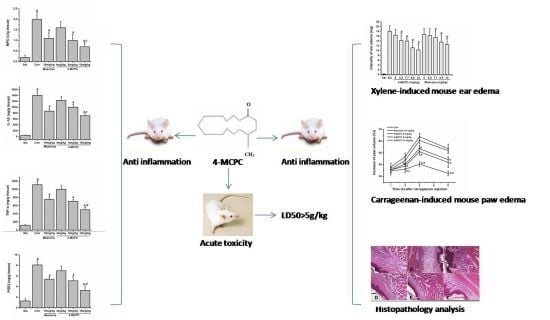Anti-Inflammatory Effects of 4-Methylcyclopentadecanone on Edema Models in Mice
Abstract
Share and Cite
Ma, Y.; Li, Y.; Li, X.; Wu, Y. Anti-Inflammatory Effects of 4-Methylcyclopentadecanone on Edema Models in Mice. Int. J. Mol. Sci. 2013, 14, 23980-23992. https://doi.org/10.3390/ijms141223980
Ma Y, Li Y, Li X, Wu Y. Anti-Inflammatory Effects of 4-Methylcyclopentadecanone on Edema Models in Mice. International Journal of Molecular Sciences. 2013; 14(12):23980-23992. https://doi.org/10.3390/ijms141223980
Chicago/Turabian StyleMa, Yukui, Yue Li, Xiufeng Li, and Yingliang Wu. 2013. "Anti-Inflammatory Effects of 4-Methylcyclopentadecanone on Edema Models in Mice" International Journal of Molecular Sciences 14, no. 12: 23980-23992. https://doi.org/10.3390/ijms141223980
APA StyleMa, Y., Li, Y., Li, X., & Wu, Y. (2013). Anti-Inflammatory Effects of 4-Methylcyclopentadecanone on Edema Models in Mice. International Journal of Molecular Sciences, 14(12), 23980-23992. https://doi.org/10.3390/ijms141223980




